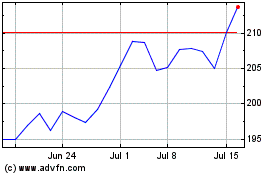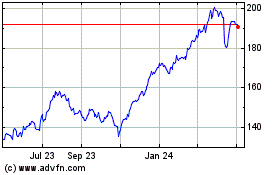By Ryan Tracy and Telis Demos
This article is being republished as part of our daily
reproduction of WSJ.com articles that also appeared in the U.S.
print edition of The Wall Street Journal (May 31, 2018).
WASHINGTON -- The Federal Reserve proposed on Wednesday easing a
rule designed to curb risky trading in the wake of the financial
crisis, one of the most significant deregulatory measures for banks
since President Donald Trump took office.
The proposal, unanimously advanced by the Federal Reserve and
known as Volcker 2.0, means JPMorgan Chase & Co., Goldman Sachs
Group Inc. and other banking behemoths would face fewer audits of
individual securities and derivatives transactions. The banks
wouldn't have to spend as much time proving compliance, and traders
would generally have more freedom to buy and sell securities.
While financial firms have been seeking the changes for years,
regulators said the proposal wouldn't bring back the highflying
days before the financial crisis when Morgan Stanley and other
powerhouses booked billion-dollar losses. Still, critics said the
proposal gives banks too much leeway and could create loopholes
that allow banks to engage in risky trading.
The proposal is part of a broader regulatory rollback that
includes a recently enacted law easing rules on small banks and
less aggressive leadership at the Consumer Financial Protection
Bureau.
Congress told regulators to draft the rule in 2010, named for
former Federal Reserve Chairman Paul Volcker, to bar big banks from
hedge-fund-like speculative trading activities. That prohibition
remains.
Regulators said they want to enforce the rule differently
because the existing practices are costly and confusing. The Fed
and other agencies wouldn't audit individual transactions as often,
but they would check to see that bank managers set limits on
traders aligned with expected customer demand. The law allows
hedging and market-making on customers' behalf.
The proposal "will allow firms to conduct appropriate activities
without undue burden and without sacrificing safety and soundness,"
Fed Chairman Jerome Powell said.
Citigroup Inc. Chief Executive Michael Corbat told investors on
Wednesday that the bank advocates the "spirit of Volcker."
But "we're all somewhat perplexed and challenged by the
implementation," Mr. Corbat said, citing the "presumption of
guilt," the lack of a single regulator and the collection of
trading data that the government doesn't appear to use.
Four other U.S. agencies are expected to follow the Fed in
proposing the changes over the next week. They will take public
comments before completing the proposal.
The proposal is drawing strong support, including the backing of
banking regulators who were tapped by former President Barack
Obama, a Democrat. A separate proposal on bank capital rules has
sparked opposition from Obama-nominated regulators.
Fed Vice Chairman for Supervision Randal Quarles, who was
nominated by Mr. Trump, said the changes were a "first effort,"
suggesting more could be proposed later.
"This isn't about allowing formerly banned types of proprietary
trading, " said Gabriel Rosenberg, a lawyer who works with banks,
referring to a bank trading for its own benefit. "This is really a
rationalization of the program."
Some critics said the proposals could create loopholes.
"Sadly, this Volcker 2.0 proposed rule appears to weaken rather
than advance the implementation" of the rule, said Andy Green, a
former aide to Sen. Jeff Merkley (D., Ore.), an author of the
Volcker rule. "The result will be more banks betting against,
rather than serving, their customers."
Mr. Volcker said in a written statement that the proposal must
"not undermine the core principle at stake -- that
taxpayer-supported banking groups, of any size, not participate in
proprietary trading at odds with the basic public and customers'
interests."
The proposal would broadly loosen compliance requirements for
all banks, though it would grant the most relief to firms with
small trading desks.
In practice, judging whether a given trade complies with the
Volcker rule has been difficult for regulators and for bankers.
Banks have spent millions of dollars developing systems to measure
trading activity and model future customers' demand. Wednesday's
proposal wouldn't do away with those systems, but it could allow
banks to simplify them.
Observers have said financial markets aren't functioning as well
as they could because big banks are nervous that certain positions
may violate the Volcker rule, though there is an open debate on the
rule's precise effect. Mr. Quarles has said the impact on liquidity
is unarguable, though hard to measure. Another Fed official on
Wednesday said many factors are affecting financial markets,
including new trading technologies.
Big banks have already cut back on trading businesses in search
of more stable revenue sources. It isn't clear those jobs will
return, even with Wednesday's proposed changes.
The current generation of top bankers, many of whom cut their
teeth in businesses outside of trading, have said that whatever
happened to Volcker they aren't planning for a return of
proprietary trading desks.
"I'm not sure banks should put large parts of their capital at
risk in proprietary trading or proprietary investing positions,"
James Gorman, Morgan Stanley chief executive, told analysts in
April.
Wednesday's proposal would eliminate a presumption that
positions held for fewer than 60 days violate the rule unless
bankers prove otherwise, directly addressing Mr. Corbat's
criticism. Instead, regulators would look to how positions are
defined under accounting rules to determine whether they constitute
short-term trading.
Regulators also would presume traders were complying with the
rule if they stayed within limits set by their trading desks, but
the government would regularly review those limits to make sure
they were set appropriately.
If a trading desk booked gains and losses that exceed $25
million over a 90-day period, that desk would have to prove it
wasn't violating the Volcker rule. But if the desk stayed under
that level, regulators would presume it was in compliance.
The proposal also would reduce the burden for banks to justify
hedging trades, asks for comment on potential changes to rules for
banks owning investment funds and seeks to reduce the impact of the
rule on foreign-owned banks' overseas activities.
There are some additional exceptions for certain types of
trading contained in the rule, such as for certain kinds of
currency trades used to manage a bank's cash resources and for
trades that are done to unwind an earlier trade placed in
error.
Some analysts said that to whatever extent Volcker allows for
more risk taking, there will still be limits on how much leverage
banks can use, and there are punitive capital requirements to own
riskier assets. The Fed is separately reviewing capital
restrictions, including the leverage limits, which could loosen for
some banks.
"Without the ability to leverage, and if some of the
transactions are considered to be in highly risk-weighted assets,
it's really hard to see how the dynamic changes to have everybody
ramp up risk," said Guy Moszkowski, an analyst at Autonomous
Research.
Regulators are also proposing to create three new categories of
banks. Those with more than $10 billion in trading assets and
liabilities would face the highest expectations under the Volcker
rule. That includes 18 firms, about half foreign-owned,
representing about 95% of total U.S. bank trading activity, agency
officials said.
Write to Ryan Tracy at ryan.tracy@wsj.com and Telis Demos at
telis.demos@wsj.com
(END) Dow Jones Newswires
May 31, 2018 02:47 ET (06:47 GMT)
Copyright (c) 2018 Dow Jones & Company, Inc.
JP Morgan Chase (NYSE:JPM)
Historical Stock Chart
From Mar 2024 to Apr 2024

JP Morgan Chase (NYSE:JPM)
Historical Stock Chart
From Apr 2023 to Apr 2024
